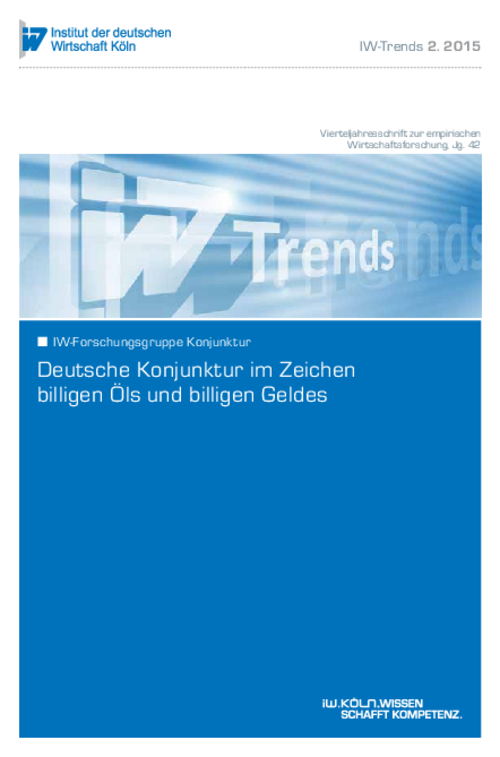The German economy began the year 2015 with considerable momentum on the consumption side. A number of factors are currently raising consumer sentiment and private consumption: falling energy prices, extremely low interest rates, the good situation on the labour market as well as oneoff income increases due the introduction of the legal minimum wage and due to public pension policy. Next year, however, many of these mostly singular effects will have worn off, leaving buoyancy in spending on private consumption to ease again significantly. Against this background, real economic growth of almost 2 ¼ per cent is forecast for the year 2015. For 2016, a considerably lower increase in real GDP of just over 1 ½ per cent is to be expected. Despite a steep fall in the euro, foreign trade and business investment will only partly make up for the weaker growth in private consumption in 2016. The resulting growth decline in 2016 will leave Germany stuck with the sawtooth-shaped growth path of recent years. The good economic prospects for 2015 are largely due to the numerous special factors and by no means a corroboration of the economic policy of the German government. On the contrary, the good economic situation is papering over existing economic policy problems and higher cost burdens. These strains will only make themselves more apparent in the next recession. Thus, economic policy should change course already today in order to foster investment and growth on a more durable basis.

The German Economy in Times of Cheap Oil and Cheap Money
IW-Trends


IW-Forschungsgruppe Konjunktur: Deutsche Konjunktur im Zeichen billigen Öls und billigen Geldes
IW-Trends

More on the topic

Determinants of personnel planning in Germany
The German labor market has been growing since 2005. The dip in the wake of the coronavirus pandemic between 2020 and 2022 is an exception, as the German labor market has reached a record level of 45.9 million people in employment by 2023.
IW
Effects of the Middle East conflict on the German economy
Beyond the humanitarian crisis associated with the geopolitical conflict in Israel, which affects millions of human lives, the Middle East conflict also leaves lasting marks on economic activity not only in the affected region, but also in Germany and the ...
IW